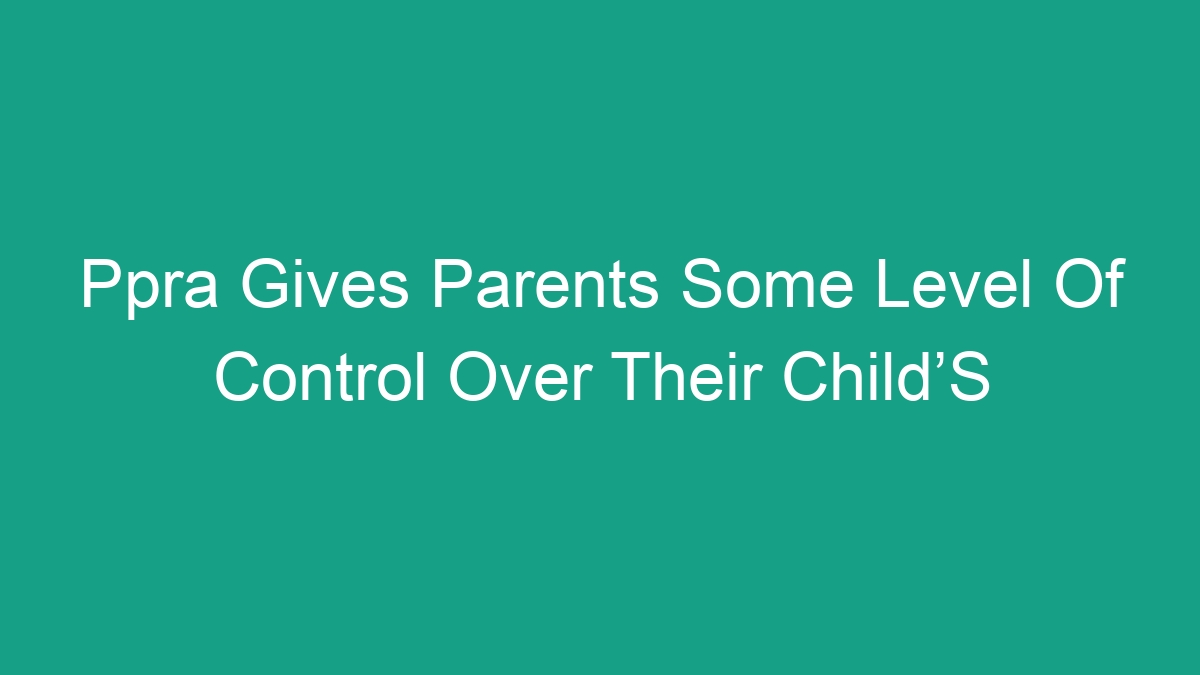
As a parent, you want the best for your child, including the best education. The Protection of Pupil Rights Amendment (PPRA) is a federal law that gives parents some level of control over their child’s education. Whether you’re a parent or an educator, it’s important to understand what PPRA entails and how it impacts students and their families.
What is PPRA?
PPRA stands for the Protection of Pupil Rights Amendment. The law was enacted in 1978 and is designed to protect the rights of parents and students in regards to certain types of surveys, evaluations, and other materials used in public schools. PPRA requires schools to obtain written consent from parents before students can be required to participate in certain types of surveys, tests, or evaluations that ask about sensitive topics such as political or religious beliefs, social or psychological problems, or sexual behavior and attitudes.
The goal of PPRA is to ensure that parents have the opportunity to review and consent to their child’s participation in these activities and to give them some level of control over the information that is collected. The law also aims to prevent the collection of personal information about students for marketing purposes without parental consent.
Key Provisions of PPRA
Here are some key provisions of PPRA that parents and educators should be aware of:
- Parental Consent: Schools must obtain written consent from parents before students can be required to participate in certain types of surveys, tests, or evaluations that ask about sensitive topics as outlined in the law.
- Notification: Schools must notify parents of their rights under PPRA at the beginning of each school year and whenever there are changes to the policies regarding student participation in surveys, evaluations, and other activities covered by the law.
- Opt-Out Option: Schools must offer parents the option to opt their child out of participating in activities covered by PPRA if they do not wish for their child to participate.
- Restrictions on Marketing: PPRA prohibits schools from collecting personal information about students for marketing purposes without parental consent.
Empowering Parents Through PPRA
PPRA gives parents the power to make informed decisions about their child’s education and to have a say in the kinds of information that schools can collect from their children. By requiring schools to obtain parental consent for certain activities, PPRA empowers parents to be actively involved in their child’s education and to protect their child’s privacy.
As a parent, it’s important to stay informed about your rights under PPRA and to carefully review any notifications or consent forms that are sent home by your child’s school. By understanding PPRA and exercising your rights under the law, you can ensure that your child’s privacy is protected and that they only participate in activities that align with your family’s values and beliefs.
Impact on Students and Families
PPRA has a significant impact on students and their families by giving parents more control over their child’s educational experience. Here are some ways in which PPRA affects students and families:
- Privacy Protection: PPRA helps to protect the privacy of students by ensuring that sensitive information is not collected without parental consent.
- Parental Involvement: PPRA encourages parental involvement in their child’s education by requiring schools to obtain consent for certain activities.
- Ethical Considerations: PPRA raises awareness about the ethical considerations of collecting sensitive information from students and the importance of parental consent.
Compliance and Enforcement
It’s important for schools to understand and comply with PPRA to ensure that they are protecting the rights and privacy of their students and their families. The U.S. Department of Education is responsible for enforcing PPRA and investigating complaints related to its provisions. If you believe that your child’s school may be in violation of PPRA, you have the right to file a complaint with the Department of Education.
By staying informed about PPRA and holding schools accountable for compliance, parents can ensure that their child’s rights and privacy are protected within the school setting.
Conclusion
PPRA gives parents an important level of control over their child’s education by requiring schools to obtain written consent for certain types of surveys, tests, and evaluations. By understanding the provisions of PPRA and staying informed about their rights under the law, parents can make informed decisions about their child’s education and ensure that their privacy is protected.
As an educator, it’s important to uphold the provisions of PPRA and to communicate openly with parents about the school’s policies regarding student participation in surveys, evaluations, and other activities covered by the law. By fostering a collaborative relationship with parents, educators can work together to create a safe and respectful educational environment for all students.



